BBC.com: McDonald’s and supermarkets failed to spot slavery
Signs that modern slavery victims were being forced to work at a McDonald’s branch and a company supplying bread products to major supermarkets were missed for years, the BBC has found.
https://www.bbc.com/news/articles/c2kdg84zj4wo
A gang forced 16 victims to work at either the fast-food restaurant or the factory – which supplied Asda, Co-op, M&S, Sainsbury’s, Tesco and Waitrose.
Well-established signs of slavery, including paying the wages of four men into one bank account, were missed while the victims from the Czech Republic were exploited over more than four years.
McDonald’s UK said it had improved systems for spotting “potential risks”, while the British Retail Consortium said its members would learn from the case.
Six members of a family-run human trafficking network from the Czech Republic have been convicted in two criminal trials, which were delayed by the Covid pandemic.
Reporting restrictions have prevented coverage of much of the case, but BBC England can now reveal the full scale of the gang’s crimes – and the missed opportunities to stop them.
Nine victims were forced to work at the McDonald’s branch in Caxton, Cambridgeshire. Nine worked at the pitta bread company, with factories in Hoddesdon in Hertfordshire and Tottenham in north London, which made supermarket own-brand products. There were 16 victims in total across both sites, as two worked at both McDonald’s and the factory.
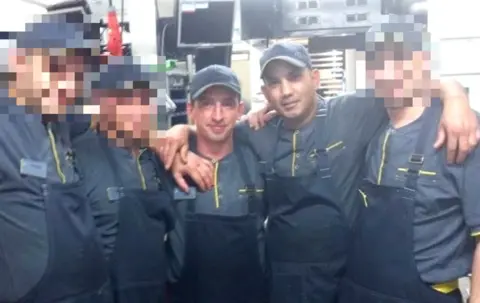
The victims – who were all vulnerable, most having experienced homelessness or addiction – earned at least the legal minimum wage, but nearly all of their pay was stolen by the gang.
While they lived on a few pounds a day in cramped accommodation – including a leaking shed and an unheated caravan – police discovered their work was funding luxury cars, gold jewellery and a property in the Czech Republic for the gang.
On several occasions, victims escaped and fled home only to be tracked down and trafficked back to the UK.
The exploitation ended in October 2019 after victims contacted police in the Czech Republic, who then tipped off their British counterparts.
But warning signs had been missed for at least four years, the BBC has discovered by reviewing legal documents from the gang’s trial and interviewing three victims.
The undetected red flags include:
- Victims’ wages were paid into bank accounts in other people’s names. At the McDonald’s, at least four victims’ wages – totalling £215,000 – were being paid into one account, controlled by the gang
- Victims were unable to speak English, and job applications were completed by a gang member, who was even able to sit-in on job interviews as a translator
- Victims worked extreme hours at the McDonald’s – up to 70 to 100 a week. One victim worked a 30-hour shift. The UN’s International Labour Organization says excessive overtime is an indicator of forced labour
- Multiple employees had the same registered address. Nine victims lived in the same terraced home in Enfield in north London while working at the bakery
“It really concerns me that so many red flags were missed, and that maybe the companies didn’t do enough to protect vulnerable workers,” said Dame Sara Thornton, the former independent anti-slavery commissioner, who reviewed the BBC’s findings.
Det Sgt Chris Acourt, who led the Cambridgeshire Police investigation, said there were “massive opportunities” that were missed to detect the slavery and alert authorities sooner.
He says he was lured in with the false promise of a well-paid job in the UK, where he could at the time work legally.
But the reality of what he experienced has left lasting scars, he said.
“You can’t undo the damage to my mental health, it will always live with me.”
He was given just a few pounds a day in cash by his exploiters, despite working 70-hour weeks at the McDonald’s branch, he said.
The gang – led by brothers Ernest and Zdenek Drevenak – confiscated the passports of all their victims and controlled them through fear and violence, police found.
“We were afraid,” Pavel said. “If we were to escape and go home, [Ernest Drevenak] has a lot of friends in our town, half the town were his mates.”
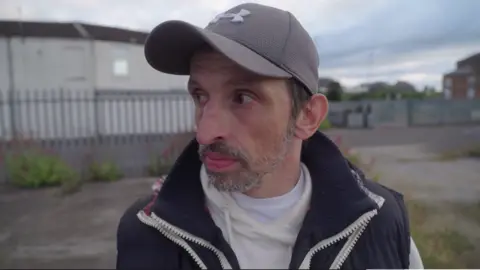
The gang “treated their victims like livestock” feeding them just enough “to keep them going”, according to the Met’s Det Insp Melanie Lillywhite.
She said victims were controlled by “invisible handcuffs” – monitored by CCTV, prevented from using phones or the internet and unable to speak English.
“They really were cut off from the outside world,” she said.
While the gang has been convicted in court, Pavel believes McDonald’s also shares some responsibility.
“I do feel partially exploited by McDonald’s because they didn’t act,” he said.
“I thought if I was working for McDonald’s, that they would be a little bit more cautious, that they will notice it.”
Two former colleagues told the BBC the extreme hours the men worked – and the impact it had on them – was plain to see.
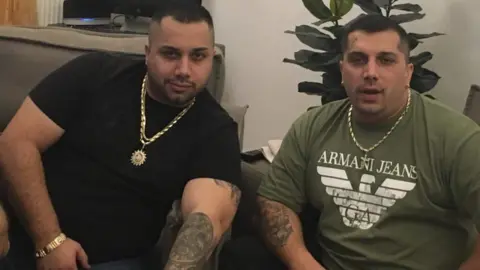
Like most McDonald’s, the Caxton outlet – on the A428 – is a franchise, which means an independent business pays the fast-food giant to allow it to run the restaurant.
While victims worked there between 2015 and 2019, it was run by two different franchise-holders. We contacted both, but they did not respond.
McDonald’s UK declined our offer of an interview, but provided a statement on behalf of the corporation and its franchisees.
It said the current franchisee – Ahmet Mustafa – had only been “exposed to the full depth of these horrific, complex and sophisticated crimes” in the course of his co-operating with police and the prosecution.
The company said it cares “deeply” about all employees and promised that – working with franchisees – it would “play our part alongside government, NGOs [Non-governmental organisations] and wider society to help combat the evils of modern slavery”.
It also said it commissioned an independent review in October 2023 and had taken action to improve its ability to “detect and deter potential risks, such as: shared bank accounts, excessive working hours, and reviewing the use of interpreters in interviews”.
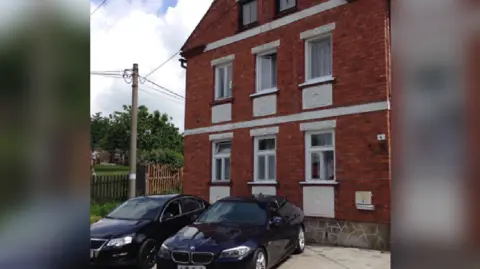
The bakery company – Speciality Flatbread Ltd – ceased trading and went into administration in 2022.
None of the supermarkets detected the slavery while victims worked at the factory between 2012 and 2019.
Dame Sara said she would have expected the retailers to be doing “pretty thorough due diligence”, adding that they normally “take much greater care about their own brand products because that’s their reputation that’s on the line”.
Sainsbury’s said it stopped using the company as an own-brand supplier in 2016.
The others only stopped sometime after police rescued the victims in 2019.
Asda told the BBC it was “disappointed that a historic case has been found in our supply chain”, adding that it would “review every case identified and act upon the learnings”.
It said it had made three site visits, but focused solely on food safety, and had stopped using the factory in 2020.
Tesco said inspections – supported by information from anti-slavery charity Unseen – “revealed concerning working practices” and the company “ceased all orders from the supplier” in 2020.
Waitrose said it pulled out in 2021 after its audits led to “concerns about factory standards and working conditions”.
The Co-op said it made “a number” of unannounced inspections, including worker interviews, but found no signs of modern slavery, adding that the company “actively work to tackle the shocking issue… both in the UK and abroad”.
M&S said it suspended and delisted the company in 2020 after it “became aware of potential breaches of ethical labour standards via the modern slavery helpline”.
The British Retail Consortium said workers’ welfare was “fundamental” to retailers, who it said acted quickly when concerns are raised.
“Nonetheless, it is important that the retail industry learns from cases like this to continually strengthen due diligence,” it said.
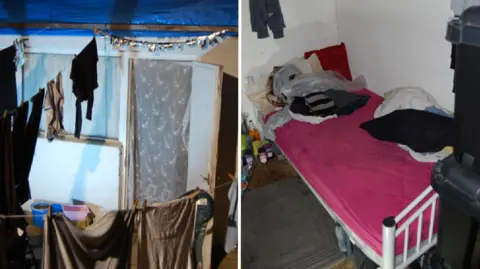
Speciality Flatbreads’ director Andrew Charalambous did not respond to written requests for comment, but in a phone call from the BBC said he had supported the police and prosecution, adding that the company had been “thoroughly audited by top law firms” and “everything we were doing was legal”.
He added: “From our perspective we didn’t break the law in any way, having said that, yes, maybe you’re right in that maybe there were certain telltale signs or things like that, but that would have been for the HR department who were dealing with it on the front line.”
The Modern Slavery Act requires larger companies – including McDonald’s and the supermarkets, but not the factory – to publish annual statements outlining what they will do to tackle the issue.
Former Prime Minister Baroness Theresa May, who introduced the act as home secretary in 2015, accepted the law failed to protect victims in this case, and believes it needs to be “beefed up”.
The former PM – who now leads the Global Commission on Modern Slavery and Human Trafficking – said the case was “frankly shocking” and shows “large companies not properly looking into their supply chains”.
She said the global commission was reviewing what new laws are needed “to ensure action is being taken by companies”.
Responding to the case, the government said it would “set out next steps on the issue of modern slavery in due course”.
It said it was “committed to tackling all forms of modern slavery” and would “pursue gangs and employers with every lever at our disposal while ensuring that victims are provided with the support they need”.
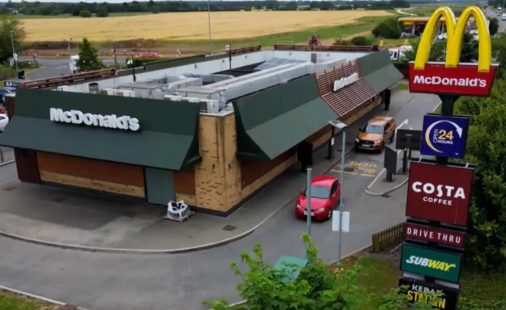
About the author